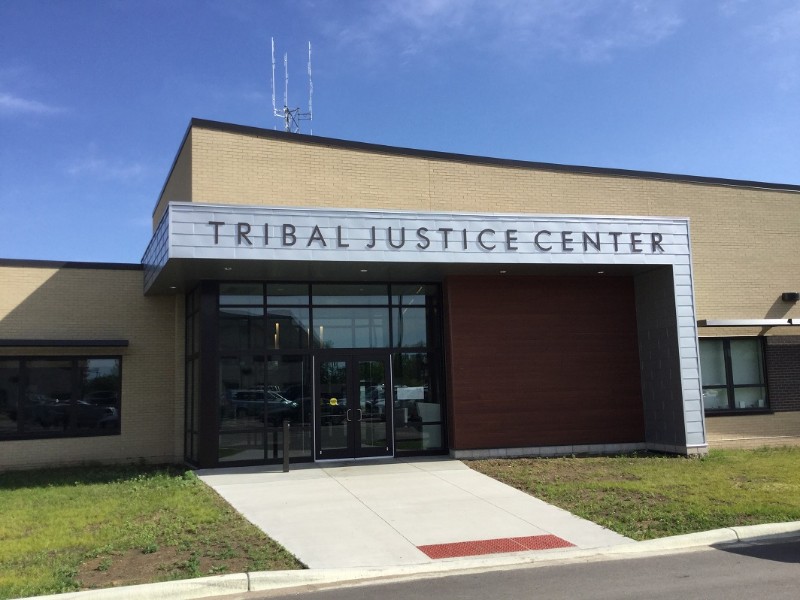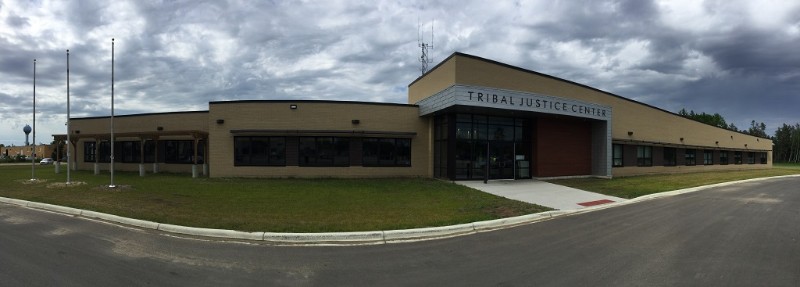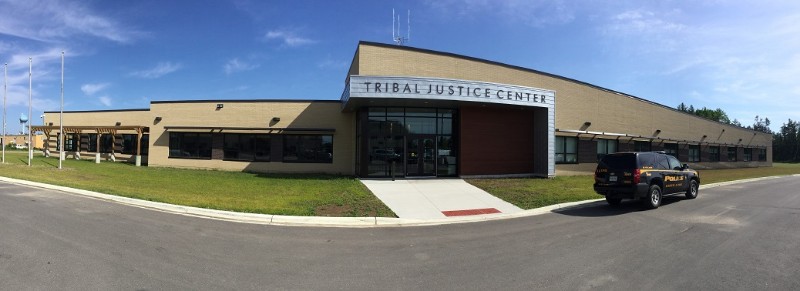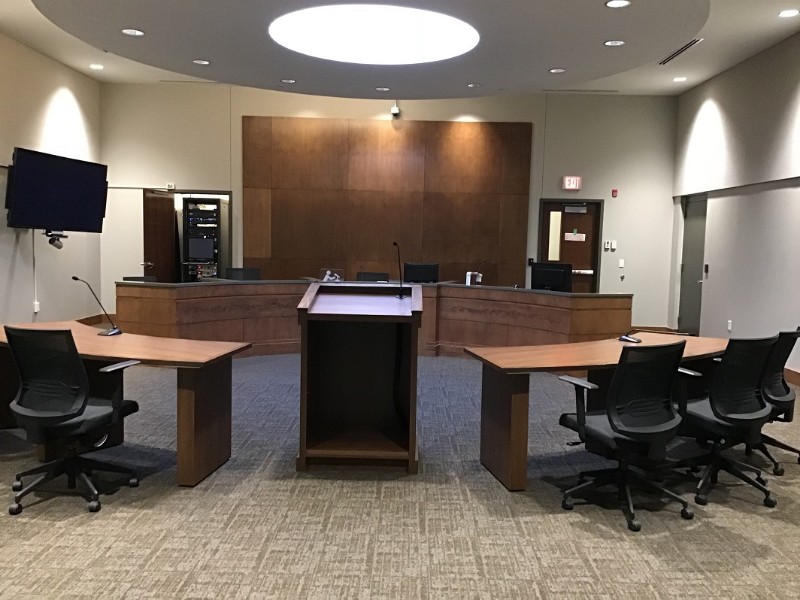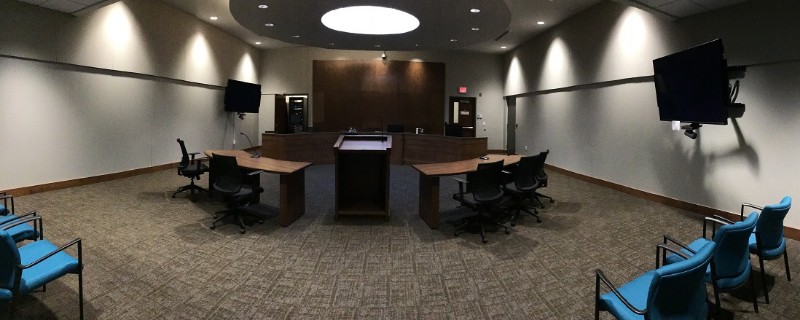
front-justice

Justice-Center-panoramic

justice

Nishige-Courtroom-2

Nishige-Courtroom
Place Category: Specialized Court Projects
- LEECH LAKE BAND OF OJIBWE JOINT JURISDICTION HEALING TO WELLNESS COURTS
- PROGRAM DESCRIPTION
- PLANNING & IMPLEMENTATION
- PROGRAM OUTCOMES
Summary: The Leech Lake Band of Ojibwe tribal court and the Cass County (Minnesota) court developed a joint jurisdiction court in response to the serious substance abuse problem in their communities. Because no similar court existed anywhere, the two courts worked together to create a new model. The courts developed a set of goals for the joint jurisdiction court: improving access to justice, administering justice for effective results, and fostering public trust, accountability, and impartiality. With these goals in mind, the Cass County judge and the tribal court judge began conducting joint hearings for the cases of defendants charged with driving while intoxicated. After seeing the success of the Leech Lake/Cass County court, Leech Lake partnered with Itasca County to establish a second joint jurisdiction court that handles drug-related offenses.
Tribe:
Leech Lake Band of Ojibwe
Program:
Joint Jurisdiction Courts
Program Running Length:
Since July 2006
Contact:
Shirley Smith, Coordinator
218-547-7237
218-547-7420
Leech Lake/Cass County Wellness Court
200 Minnesota Avenue
Walker, MN 56484
Location:
The Leech Lake Band of Ojibwe community is located in northern Minnesota. It overlaps with four Minnesota counties: Cass, Itasca, Beltrami, and Hubbard.
Land Characteristics:
The reservation covers 972.517 square miles of land and 337.392 square miles of water. One-fourth of the reservation is covered by lakes. The tribe uses 40 of these lakes to produce wild rice.
Population:
The Leech Lake reservation has a population of about 11,000 people. The number of enrolled members of the Leech Lake Band of Ojibwe is about 9,500.
Minnesota is a Public Law 280 state, and the Leech Lake Band of Ojibwe has chosen not to exercise concurrent criminal jurisdiction with the state. Therefore, tribal members are arrested, prosecuted, and sentenced through the state criminal justice system. Prior to the creation of the joint jurisdiction courts, the tribe had no role or voice in the criminal justice system’s involvement with its members. Tribal members also lacked access to a culturally appropriate justice system, as state courts are often not equipped to meet the unique needs of Native defendants.Both the Leech Lake community and Cass County experienced serious drug and alcohol abuse problems in the early 2000s. However, neither the Leech Lake tribal court nor the Cass County court were able to address these problems alone. As stated by Korey Wahwassuck, former chief judge for the Leech Lake Band of Ojibwe, and co-founder of the joint jurisdiction courts, “State courts have historically placed the focus on the symptoms of drug and alcohol abuse and these courts are often inadequately equipped to deal with the root causes of these problems. Tribal courts place more focus on the root causes but may not have the resources to effectively treat them. Potentially overlapping and conflicting jurisdictional claims also complicate efforts to address these issues.”The Leech Lake/Cass County joint jurisdiction court handles the cases of both Leech Lake tribal members and non-tribal members charged with driving while intoxicated (DWI) in Cass County. The Leech Lake/Itasca County joint jurisdiction court handles the cases of both Leech Lake tribal members and non-tribal members charged with drug-related offenses in Itasca County.In 2006, Cass County Probation Officer Reno Wells and Cass County District Court Judge John Smith met withLeech Lake Tribal Chairman George Googleye andTribal Court Judge Korey Wahwassuck to ask for helpin forming a drug treatment court that would address the community’s substance abuse problems. Officer Wells and Judge Smith believed that tribal court participation would increase tribal member buy-in to the drug court. Chairman Googleye faced some resistance from tribal members to working with the counties, but the potential benefits of the program convinced the community to embrace it. Judge Wahwassuck found that both the tribal court and the county court shared common goals and responsibilities but neither could accomplish these goals alone. These shared interests convinced Judge Wahwassuck to work with Officer Wells and Judge Smith to create a joint jurisdiction court.
- “Not only will this benefit our tribal members…but it will benefit a lot of other people as well because they are going to get to take advantage of the benefits that exist because of the court.” – George Googleye
On March 14, 2006, the Leech Lake Tribal Council passed a resolution approving and authorizing the participation of the Leech Lake Band as a partner in the Leech Lake Band of Ojibwe/Cass County Wellness Court.
On February 23, 2007, the Leech Lake tribal flag was installed in the Cass County District Court. District Judge John P. Smith said the flag “reflected mutual trust among law enforcement team members and both tribal and state judges.”Judges Wahwassuck and Smith then came together to create a list of goals for the program, which have subsequently guided the program through times of confusion and conflict. These goals resulted in the Joint Powers Agreement, signed by both the Leech Lake tribal court and the Cass County court on July 19, 2007. The Joint Powers Agreement sets out three goals: improving access to justice, administering justice for effective results, and fostering public trust, accountability, and impartiality. The joint jurisdiction courts have also developed Memoranda of Understanding (MOUs), which guide the day-to-day operations of the courts.
After seeing the success of the Leech Lake/Cass County court, the Leech Lake tribal court and the Itasca County court decided to partner to create another joint jurisdiction court. On February 12, 2008, the County Board of Commissioners of Itasca County adopted a resolution in support of a Joint Powers Agreement between the Leech Lake Tribal Court and the 9th Judicial District Court (Itasca County). This resolution stated that the Joint Powers Agreement would “ the Courts’ working relationship toward mutual goals of improving access to justice, administering justice for effective results, and fostering public trust, accountability, and impartiality.”With Itasca County’s support, the county court judge and the tribal court judge began collaborating to create the joint jurisdiction court by developing a set of goals similar to the Leech Lake/Cass County joint jurisdiction court. On February 22, 2008, the judges of the 9th Judicial District (Itasca County) and the judges of the Leech Lake Tribal Court signed a Joint Powers Agreement, reflecting these goals.The Leech Lake/Cass County and the Leech Lake/Itasca County Joint Jurisdiction Courts’ Joint Powers Agreements set out three goals:
- Improving access to justice;
- Administering justice for effective results; and
- Fostering public trust, accountability, and impartiality;
Both a Leech Lake tribal court judge and a Cass County court judge preside over the Leech Lake/Cass County joint jurisdiction court. The court handles driving while intoxicated (DWI) cases involving both tribal members and non-Indians. Both judges actively participate in each case, sitting on the bench together and asking questions during hearings with the participants.Observers have noted that the involvement of two judges facilitates time management, aids review of case rules, and provides coverage if one judge is absent.The Leech Lake/Cass County court also uses a closed circuit television feedto connect the tribal court and the county court through a video link. This enables defendants to go to either court, providing a convenient way for residents with limited transportation to attend court.
The Leech Lake/Cass County Court has a three-phase structure, which consists of a Treatment Phase, a Transition Phase, and a Living Well Phase. Participants are required to attend all court and treatment appointments throughout the phases of the program. Participants must set goals and meet those goals before graduation from the program. Graduation from the program also requires participants to address their addiction by maintaining 180 days of sobriety, demonstrating an understanding of their addiction, and creating a plan for relapse prevention. Participants must also address challenges in other parts of their lives, such as education, employment and housing.
The Leech Lake/Itasca County court handles drug-related offenses. The court is held at the Itasca County court, where the county court judge and the tribal court judge hear cases together. Like the Cass County court, all three Itasca County courtrooms have installed the Leech Lake tribal flag, a symbol of collaboration.Each Wellness Court multidisciplinary team includes the judges, probation officers, defense attorneys, treatment providers, the designated prosecutor, law enforcement and the program coordinator.Staffing meetings take place before every court session to review the progress and plans for each Wellness Court participant. The tribal court and county court do this collaboratively over ITV (interactive television).The Leech Lake/Cass County Joint Jurisdiction Court was created with funding from the Minnesota State Court Administrator’s Office and the Bureau of Justice Assistance, Tribal Courts Assistance Program.The program is currently funded as a DWI Court by the Department of Public Safety.Once the Wellness Courts were up and running, they invited technical assistance providers to provide feedback about the operation of the courts. Eventually, the Wellness Courts began providing advice to other communities interested in adopting the joint jurisdiction model.The joint jurisdiction courts are partnerships between the county justice agencies, such as the courts, probation, law enforcement and treatment providers, and the Leech Lake tribal court and tribal service providers.Both the Leech Lake tribal court and the Cass County court came together to create a list of goals at the outset of the program. These goals served as a guide for resolving issues and conflicts.
- “No one has given up power or authority. We’re working toward common goals, figuring out how we can work together.” – Judge Korey Wahwaasuck
Former tribal court judge Korey Wahwassuck reported that the Wellness Courts have improved the tribe’s relationship with the neighboring counties. Prior to the creation of the joint jurisdiction court, the tribal court had no voice in criminal cases involving tribal members. The joint jurisdiction courts allowed the tribal court to provide valuable input in criminal cases where it would normally have no role. Before this collaboration, the county courts and tribal court had limited, mostly adversarial, interactions. Now, the courts work together to provide important services to their communities.
In addition, the presence of the tribal court judge gives the Wellness Courts legitimacy in the eyes of tribal members, and helps them feel more comfortable with the court. Tribal members also benefit by gaining access to treatment and restorative options through the Wellness Court that they wouldn’t have access to in a standard courtroom setting. Also, the joint jurisdiction courts have better outcomes with the use of limited resources.Prior to the creation of the Leech Lake/Cass County Joint Jurisdiction Court, no similar program existed anywhere in the country. The judges, unsure how to handle the complexity of creating a multi-jurisdictional court, looked for a model to guide their program, but they were unable to find a similar courton which to model their process. Thus, partner courts faced the daunting task of creating a system from scratch—as Judge Wahwassuck notes,“We’re always kind of surprised that no one else has done this. We kept looking for a model but this was the first one ever.”Judge Wahwassuck learned firsthand that collaboration between state courts and tribal courts must occur at both the judicial and administrative levels. She found that those who work in the daily operations of the court must take ownership of a new collaborative effort in order for it to be successful. This requires that state court staff and judgeshave an understanding of tribal courts. To facilitate such understanding, tribal court administrative staff attend the Minnesota Ninth Judicial District State Court Administrators’ quarterly meetings. These meetings allow administrative staff to “share ideas and discuss challenges,” thus facilitating cross-jurisdictional collaboration.The program caps participants at 25 individuals.The Joint Jurisdiction Courts have improved outcomes for participants. Graduates aremore likely to be employed, attending school, have stable housing, reinstated driving privileges and healthier lifestyles. The court also reports that the majority of participants have gone through the program with limited to no sanctions.
Additionally, the Leech Lake/Cass County/Itasca County Wellness Courts have won several national awards, including the Harvard Honoring Nations Award, the National Association of Drug Court Professionals Cultural Proficiency Courage Award, and the National Criminal Justice Association Outstanding Tribal Criminal Justice Award.The community responded favorably to the Court for the most part. There were multiple community presentations to keep them informed as to what the stakeholders were trying to accomplish and the community supported the idea. There were some skeptical to believe this program could have any more success than a traditional treatment program. However, many of those skeptics have since come to graduations for participants and have stated they never thought they would see the success of these people who they have watched struggle with addiction for decades.All of the participants in this program have come into the program at a very difficult time in their lives. Their addiction had destroyed their family, relationships, employment, health, self-esteem, and freedom. One young woman stated at her graduation how although she wasn’t very happy in the beginning, she has now gained employment, got her license reinstated, bought a house, reunited with her family and has gained self esteem that she never thought she would have. There have been numerous similar stories from the graduates and even some that didn’t make it through the program have reached out to the team later and expressed their thanks because the program did help them on the road to finally “getting it”.
- “While relationships between the Leech Lake Band of Ojibwe and surrounding counties have historically been strained, the joint work broke down cultural barriers and resulted in more effective administration of justice in northern Minnesota.” – Judge Wahwassuck
- Wahwassuck, K. “The New Face of Justice,” Washburn Law Journal, 47(3).
- Joint Jurisdiction Courts: A Manual for Developing Tribal, Local, State, & Federal Justice Collaborations.
- Sample MOU
- A place of healing: Officials celebrate 10th anniversary of Wellness Courts in Cass Lake – Bemidji Pioneer, Dec 8, 2016
- “Joint tribal-state jurisdiction is the new face of justice in northern Minnesota, where concurrent jurisdiction no longer has to result in an “either-or” choice between forums. Each jurisdiction, be it tribal or state, brings to the table tools unique to its system, and by exercising jurisdiction cooperatively the courts can leverage scarce resources and achieve better results for those willing to venture into this new frontier of jurisprudence.” – Judge Wahwassuck
- LEECH LAKE BAND OF OJIBWE JOINT JURISDICTION HEALING TO WELLNESS COURTS
No Records Found
Sorry, no records were found. Please adjust your search criteria and try again.
Google Map Not Loaded
Sorry, unable to load Google Maps API.

